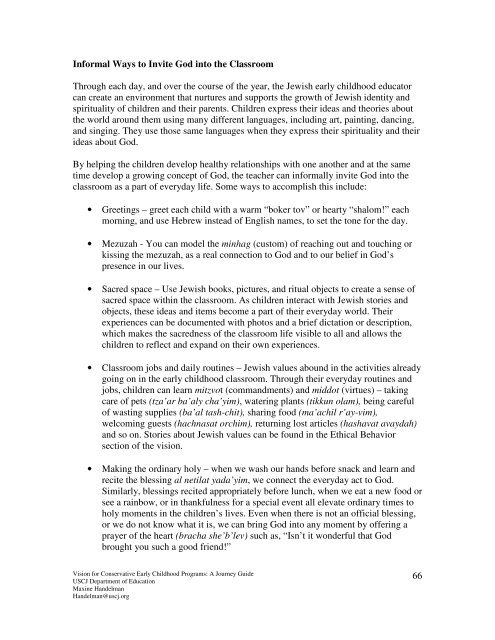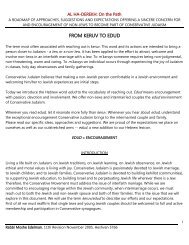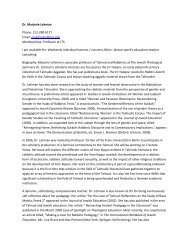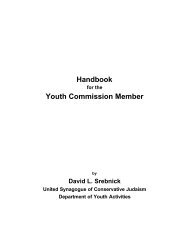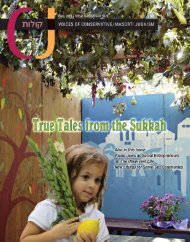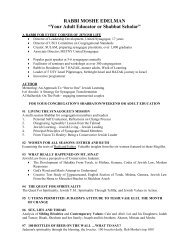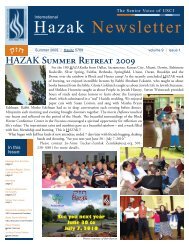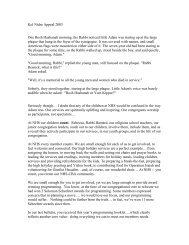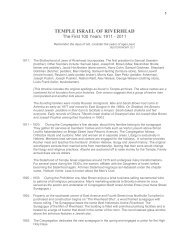Vision for Conservative Early Childhood Programs: A Journey Guide
Vision for Conservative Early Childhood Programs: A Journey Guide
Vision for Conservative Early Childhood Programs: A Journey Guide
Create successful ePaper yourself
Turn your PDF publications into a flip-book with our unique Google optimized e-Paper software.
In<strong>for</strong>mal Ways to Invite God into the Classroom<br />
Through each day, and over the course of the year, the Jewish early childhood educator<br />
can create an environment that nurtures and supports the growth of Jewish identity and<br />
spirituality of children and their parents. Children express their ideas and theories about<br />
the world around them using many different languages, including art, painting, dancing,<br />
and singing. They use those same languages when they express their spirituality and their<br />
ideas about God.<br />
By helping the children develop healthy relationships with one another and at the same<br />
time develop a growing concept of God, the teacher can in<strong>for</strong>mally invite God into the<br />
classroom as a part of everyday life. Some ways to accomplish this include:<br />
• Greetings – greet each child with a warm “boker tov” or hearty “shalom!” each<br />
morning, and use Hebrew instead of English names, to set the tone <strong>for</strong> the day.<br />
• Mezuzah - You can model the minhag (custom) of reaching out and touching or<br />
kissing the mezuzah, as a real connection to God and to our belief in God’s<br />
presence in our lives.<br />
• Sacred space – Use Jewish books, pictures, and ritual objects to create a sense of<br />
sacred space within the classroom. As children interact with Jewish stories and<br />
objects, these ideas and items become a part of their everyday world. Their<br />
experiences can be documented with photos and a brief dictation or description,<br />
which makes the sacredness of the classroom life visible to all and allows the<br />
children to reflect and expand on their own experiences.<br />
• Classroom jobs and daily routines – Jewish values abound in the activities already<br />
going on in the early childhood classroom. Through their everyday routines and<br />
jobs, children can learn mitzvot (commandments) and middot (virtues) – taking<br />
care of pets (tza’ar ba’aly cha’yim), watering plants (tikkun olam), being careful<br />
of wasting supplies (ba’al tash-chit), sharing food (ma’achil r’ay-vim),<br />
welcoming guests (hachnasat orchim), returning lost articles (hashavat avaydah)<br />
and so on. Stories about Jewish values can be found in the Ethical Behavior<br />
section of the vision.<br />
• Making the ordinary holy – when we wash our hands be<strong>for</strong>e snack and learn and<br />
recite the blessing al netilat yada’yim, we connect the everyday act to God.<br />
Similarly, blessings recited appropriately be<strong>for</strong>e lunch, when we eat a new food or<br />
see a rainbow, or in thankfulness <strong>for</strong> a special event all elevate ordinary times to<br />
holy moments in the children’s lives. Even when there is not an official blessing,<br />
or we do not know what it is, we can bring God into any moment by offering a<br />
prayer of the heart (bracha she’b’lev) such as, “Isn’t it wonderful that God<br />
brought you such a good friend!”<br />
<strong>Vision</strong> <strong>for</strong> <strong>Conservative</strong> <strong>Early</strong> <strong>Childhood</strong> <strong>Programs</strong>: A <strong>Journey</strong> <strong>Guide</strong><br />
USCJ Department of Education<br />
Maxine Handelman<br />
Handelman@uscj.org<br />
66


